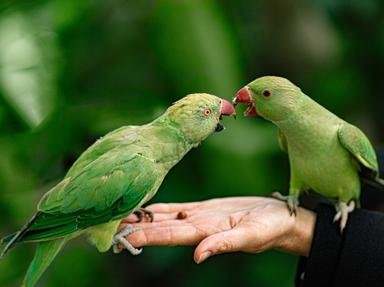Quiz Answer Key and Fun Facts
1. You probably know that the cockatiel's native country is Australia. But do you know what their habitat is like? Do wild cockatiels live mainly in the grassy, sub-tropical regions of their home country?
2. In addition to the "normal gray" color found on wild cockatiels, there are many colors which have been formed over time by selective breeding. Which of these is NOT a color mutation found on domestic cockatiels?
3. Although fruits and vegetables are good for occasional snacks, it's fine to feed a cockatiel seed mixes for most of his diet.
4. You may know which foods a cockatiel can eat, but do you know which of these foods may be toxic to a cockatiel?
5. Cuttlebone is a white, chalky substance, which cockatiels can chew on to keep their beaks healthy.
6. This one's a bit of a toughie: Some types of cockatiel, as well as having distinctive coloring, also have other physical characteristics unique to their particular coloration. One of these is the bald spot, found on the back of the bird's head under and behind its crest. This feature occurs most often on the birds of which coloration?
7. Where is the best place in a typical house to put a cockatiel's cage?
8. As long as your cockatiel seems healthy, you don't ever need to take him to the vet. As long as you're paying attention, if he does get sick it'll be easy to notice and you can get him there in plenty of time.
9. If your cockatiel somehow escapes to the outdoors, what can you do to get him back inside safely?
10. Cockatiels tend to be uncomfortable with changes in their environment, so periodically rearranging toys and perches in their cage, and furniture or items in the room where they live, is not a good idea.
Source: Author
cardinal01
This quiz was reviewed by FunTrivia editor
crisw before going online.
Any errors found in FunTrivia content are routinely corrected through our feedback system.

